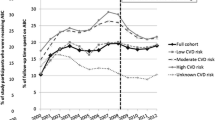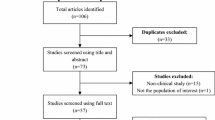Abstract
Since the presentation of the D:A:D study results at the Conference on Retroviruses and Opportunistic Infections in February 2008, 10 studies have explored the association between exposure to abacavir and the risk of myocardial infarction. Among the five larger studies, three conclude that there is an association and two that the association is not robust. Based on these studies, it is impossible to refute or confirm a causal relationship, as it is not possible to exclude remaining confounding (smoking in two of the studies, kidney function in two of the studies, cocaine and/or intravenous drug use) and selection bias in studies that report a robust association. In addition, no convincing mechanism has been described.
Similar content being viewed by others
References
Papers of particular interest, published recently, have been highlighted as: • Of importance •• Of major importance
Gallet B, Pulik M, Genet P, et al.: Vascular complications associated with use of HIV protease inhibitors. Lancet 1998, 351:1958–1959.
Henry K, Melroe H, Huebsch J, et al.: Severe premature coronary artery disease with protease inhibitors. Lancet 1998, 351:1328.
Mary-Krause M, Cotte L, Simon A, et al.: Increased risk of myocardial infarction with duration of protease inhibitor therapy in HIV-infected men. AIDS 2003, 17:2479–2486.
••DAD Study Group, Friis-Møller N, Reiss P, et al.: Class of antiretroviral drugs and the risk of myocardial infarction. N Engl J Med 2007, 356:1723–1735. This is the first study to report association of PI class exposure and NNRTI class exposure with the risk of MI. This cohort study is specifically designed to study the potential effect of antiretroviral drugs on the risk of MI in HIV-infected patients.
••D:A:D Study Group, Sabin CA, Worm SW, et al.: Use of nucleoside reverse transcriptase inhibitors and risk of myocardial infarction in HIV-infected patients enrolled in the D:A:D study: a multi-cohort collaboration. Lancet 2008, 371:1417–1426. This is the first study to report associations of individual NRTI drug exposure and the risk of MI. This cohort study is specifically designed to study the potential effect of antiretroviral drugs on the risk of MI in HIV-infected patients. An association between recent abacavir exposure and the risk of MI was reported.
•Worm W, Sabin C, Weber R, et al.: Risk of myocardial infarction in patients with HIV infection exposed to specific individual antiretroviral drugs from the 3 major drug classes: The Data Collection on Adverse Events of Anti-HIV Drugs (D:A:D) study. J Infect Dis 2010, 201:318–330. This is a further analysis of the previous study reporting for the first time the associations of exposure to each individual antiretroviral drug with the risk of MI.
•Bedimo R, Westfall A, Drechsler, et al.: Abacavir use and risk of acute myocardial infarction and cerebrovascular disease in the HAART era [MOAB202]. Presented at the 5th IAS Conference on HIV Pathogenesis, Treatment, and Prevention. Cape Town, South Africa; 2009. This study raised the question of whether kidney function may be a confounder when evaluating the association between abacavir exposure and the risk of MI, without bringing definite evidence.
Obel N, Farkas DK, Kronborg G, et al.: Abacavir and risk of myocardial infarction in HIV-infected patients on highly active antiretroviral therapy: a population-based nationwide cohort study. HIV Med 2010, 11:130–136.
••Lang S, Mary-Krause M, Cotte L, et al.: Impact of individual drugs on the risk of myocardial infarction in HIV-infected patients: a case-control study nested within the FHDH ANRS Cohort CO4. Arch Intern Med 2010, In press. This is a case-control study nested with the FHDH ANRS CO4 cohort for which the analysis plan was specifically written to confirm or refute the association observed between exposure to abacavir and the risk of MI. No association was found with cumulative exposure to abacavir. An association was observed with initiating abacavir, which was not robust in sensitivity analyses, contrary to the other associations found in this study.
Durand M, Sheehy O, Baril JH, et al.: Relation between use of nucleoside reverse transcriptase inhibitors and risk of acute myocardial infarction: a nested case control study using Quebec’s public health insurance database [TUPEB175]. Presented at the 5th IAS Conference on HIV Pathogenesis, Treatment, and Prevention. Cape Town, South Africa; 2009.
Benson CA, Ribaudo H, Zheng E, et al.: No association of abacavir use with risk of myocardial infarction or severe cardiovascular disease events: results from ACTG A5001 [abstract 721]. Presented at the 16th Conference on Retroviruses and Opportunistic Infections. Montreal, Canada; 2009.
The SMART/INSIGHT and D:A:D Study Groups: Use of nucleoside reverse transcriptase inhibitors and risk of myocardial infarction in HIV-infected patients. AIDS 2008, 22:F17–F24.
Brothers CH, Hernandez JE, Cutrell AG, et al.: Risk of myocardial infarction and abacavir therapy: No increased risk across 52 GlaxoSmithKline-sponsored clinical trials in adult subjects. J Acquir Immune Defic Syndr 2009, 51:20–28.
Martin A, Bloch M, Amin J, et al.: Simplification of antiretroviral therapy with tenofovir-emtricitabine or abacavir-lamivudine: a randomized, 96-week trial. Clin Infect Dis 2009, 49:1591–1601.
Smith KY, Patel P, Fine D, et al.: Randomized, double-blind, placebo-matched, multicenter trial of abacavir/lamivudine or tenofovir/emtricitabine with lopinavir/ritonavir for initial HIV treatment. AIDS 2009, 23:1547–1556.
Costagliola D: Observation versus intervention in the evaluation of drugs: the story of hormone replacement therapy. C R Biol 2007, 330:347–355.
••Vandenbroucke JP, von Elm E, Altman DG, et al.; STROBE Initiative: Strengthening the Reporting of Observational Studies in Epidemiology (STROBE): explanation and elaboration. PLoS Med 2007, 4:e297. This is a very important article to understand the various tenets of designing and reporting and interpreting observational studies.
Ray WA: Evaluating medication effects outside of clinical trials: new-user designs. Am J Epidemiol 2003, 158:915–920.
D:A:D Study Group, Smith C: Association between modifiable and non-modifiable risk factors and specific causes of death in the HAART era: The Data Collection on Adverse Events of Anti-HIV Drugs Study [abstract 145]. Presented at the 16th Conference on Retroviruses and Opportunistic Infections. Montreal, Canada; February 8–11, 2009.
Sabin CA, Worm S, Phillips AN, Lundgren JD: Abacavir and increased risk of myocardial infarction, reply. Lancet 2008, 372:804–805.
Hsue PY, Hunt PW, Wu Y, et al.: Association of abacavir and impaired endothelial function in treated and suppressed HIV-infected patients. AIDS 2009, 23:2021–2027.
Satchell C, O’Connor E, Peace A, et al.: Platelet hyperreactivity in HIV-1-infected patients on abacavir-containing ART [abstract 151LB]. Presented at the 16th Conference on Retroviruses and Opportunistic Infections. Montreal, Canada; February 8–11, 2009.
••Martínez E, Larrousse M, Podzamczer D, et al.; BICOMBO Study Team: Abacavir-based therapy does not affect biological mechanisms associated with cardiovascular dysfunction. AIDS 2010, 24:F1–F9. This is a randomized study analysis to explore various mechanisms (markers of coagulation, inflammation, and endothelial function) that were suggested to explain a potential association between abacavir exposure and the risk of MI, showing no statistical differences.
Humphries A, Amin J, Cooper D, et al.; STEAL Study Group: Changes in cardiovascular biomarkers with abacavir: a randomized, 96-week trial [abstract 718]. Paper presented at the 17th Conference on Retroviruses and Opportunistic Infections. San Francisco, CA; February 16–19, 2010.
European Medicine Evaluation Agency: Abacavir and the risk of heart attack. Available at www.ema.europa.eu/pdfs/human/press/pr/24966009en.pdf. Accessed March 2010.
Disclosure
Dr. Mary-Krause has received honoraria from GlaxoSmithKline. Dr. Boccara has received lecture fees from Gilead Sciences. Dr. Costagliola has received travel grants, consultancy fees, honoraria, or study grants from various pharmaceutical companies, including Abbott, Boehringer-Ingelheim, Bristol-Myers Squibb, Gilead Sciences, GlaxoSmithKline, Janssen-Cilag, Merck Sharp & Dohme-Chibret, and Roche.
Author information
Authors and Affiliations
Corresponding author
Rights and permissions
About this article
Cite this article
Costagliola, D., Lang, S., Mary-Krause, M. et al. Abacavir and Cardiovascular Risk: Reviewing the Evidence. Curr HIV/AIDS Rep 7, 127–133 (2010). https://doi.org/10.1007/s11904-010-0047-3
Published:
Issue Date:
DOI: https://doi.org/10.1007/s11904-010-0047-3




